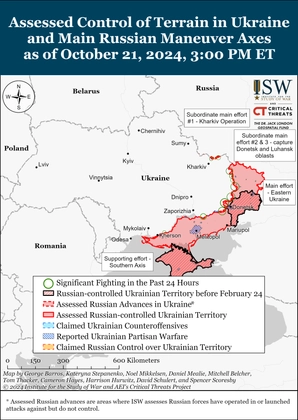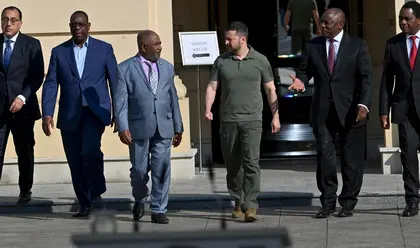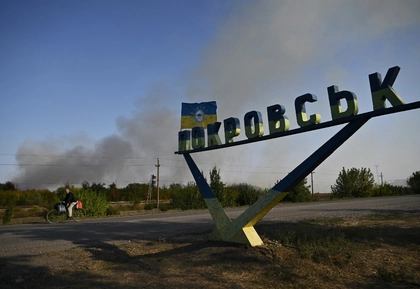The African peace plan for Ukraine represented a potential pivotal moment in Africa's emerging prominence as a mediator in global affairs, but underscored the economic realities that many African nations face because of their reliance on trade with China. It also raised further questions about the intentions of the Eastern superpower to use all available channels to help resolve the ongoing war in Ukraine.
Africa, in spite of its many troubles, has achieved what many see as a diplomatic miracle in forming the African Congress as a single platform that unites and offers a means of negotiation for many of the continent’s nations who seldom see eye to eye. The putting together of an African peace plan designed to end the Russian war in Ukraine is not a total surprise, in the light of the disruptions in the supply and prices of fuel and food that have directly affected the continent. If Africa is to sustain its own growth and avoid facing social unrest on the back of deteriorating living standards, it needs to see a resolution to the ongoing conflict between Russia and Ukraine.
JOIN US ON TELEGRAM
Follow our coverage of the war on the @Kyivpost_official.
Africa’s move, inspired as it was by its immediate needs, masks the interests of the powerful behind the scenes actor, to whom the vast majority of African states are beholden: China.
The ten-point plan the delegation presented made little reference to international borders and was almost dismissive of Ukraine’s legitimate right for its sovereignty within its 1991 territorial boundaries to be recognized. Instead, by prioritizing a ceasefire in advance of negotiations, it left many questions unanswered as to where the African states stand on the recognition of Ukraine’s claims.

ISW Russian Offensive Campaign Assessment, October, 22, 2024
The prioritization of a ceasefire is not a new narrative. Indeed, both Ukraine, in the very first days of the war, and then Russia, following Ukraine’s successful defense and counterattacks, have called for talks. Yet, perhaps the most vocal proponents of immediate cessation of hostilities have been the Chinese. The economic importance of bringing an end to the war for China is obvious. And while one can argue the benefits of inflowing cheap Russian natural resources in the absence of other markets is helping China ride the wave of market instability, or acknowledge lucrative Chinese contracts in the runup to the Russian invasion, the economic reality makes a long term war in Ukraine unfavorable to China, and not just domestically.
For Africa, Russia’s full-scale invasion of Ukraine has resulted in food and fuel shortages which will only intensify as the continent constantly struggles for these resources. An estimated shortage of 30 million tonnes of grain, leading to an almost 30 percent increase in food costs, is a significant enough considering that food costs account for as much as 60 percent of the income of the average African. Combined with increased competition for fuel, and the subsequent rise in price, there is a real doubt as to how the continent will cope with a prolonged war and the effects it has on global markets.
While the rise in the costs of food and fuel are sure to be on the minds of African leaders, they are no less worrisome for China – a major investor and lender to African states. Take South Africa, the leader of the diplomatic mission to Ukraine and Russia, as an example. Its main trading partner is China, from whom it has borrowed funds equivalent to around circa 4 percent of its GDP, while the nations from which other members of the delegation were drawn, owe even higher percentages of their country’s wealth to the eastern power.
Russia’s full-scale invasion of Ukraine and the resultant effects on the global market have made things more difficult for Africa, but also for China, which has forced it to abandon a policy of infrastructure investment and to provide borrowing that can simply service their current debts. Although there is no data to suggest that Chinese lending has caused an overextension for the Xi Jinping regime, which is the result of the way China handles and releases such data, the ability to return their investments would certainly be a worry.
At the same time, we need to keep in mind that the typical Chinese investment, or influence, vehicle in developing states – the Bridge and Road Initiative – was always more than just about money. It bought political favors in the international arena and arguably elevated those leaders who brought jobs and projects to their states, even if at the cost of crippling debt. As more and more countries begin to count the pennies for loan repayments, and their citizens use up their savings for food, the eastern giant may face dealing with a wave of defaults on loans or worse, shunning of China by smaller states it currently considers to be in its pocket.
With the economic narrative in mind, the African peace proposal takes on a new guise – that of China using intermediaries to send its messages in an attempt to end the economic storm that Russia’s invasion has caused. While Ukraine’s response in the face of any suggestions of sovereignty loss is commendable, Russia’s retort and reframing of the agenda towards the motives behind the war may be the signs of Putin’s brewing disenfranchisement from his “eternal” friendship with the Chinese.
Although the African visits can be praised as an exercise in African diplomatic reach, its Chinese links cannot be understated, nor can the absolute imperative to protect the sovereignty and territorial integrity of states in the face of external aggression.
Peace is a necessity, but one that cannot be bought at whatever cost; certainly not if it entails negating Ukraine’s territorial integrity and sovereignty. Doing so in the name of economic pragmatism, be it African or otherwise, would trigger dangerous dynamics, ultimately eroding the standing of western democracies.
The views expressed in this opinion article are the author’s and not necessarily those of Kyiv Post.
You can also highlight the text and press Ctrl + Enter






